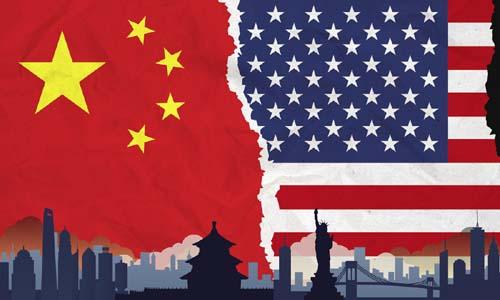
A long, centennial China-US battle of endurance
Ding Gang
Whenever I chat online with my friends in the US, we always end up discussing inflation.
In a recent conversation, a friend told me that the price of organic eggs has increased. At the beginning of the year 24 eggs cost $6.69, and now they cost $6.99. Building materials for remodeling have roughly doubled in price compared to before the pandemic.
But there is another side to the US. My friends in the US told me that jobs are growing, new factories are opening and wages are rising. As the stock market has increased, the 401(k) insurance plans that the Americans use for retirement, eligible for special tax benefits, have also risen considerably.
On August 17, Wall Street Journal published an article entitled “Stock-Market Rally Makes More 401(k) Savers Millionaires.” It noted that “some 378,000 retirement savers in Fidelity [401(k)] plans had seven-figure-plus balances as of June 30, up from 299,000 at the end of 2022.”

Here is one more statistic. PwC’s report, which analyzed the market capitalization of global listed companies as of March 31, reveals that the top 10 companies on the Global Top 100 Companies 2023 list are predominantly from the US, except for a Saudi oil company.
Apple continues to dominate the list, while other companies lead in communications, automotive, financial, consumer and other sectors.
When Washington presents China as a significant rival, we must possess a more precise and all-encompassing comprehension of the US economy. Merely examining a handful of the statistics mentioned above allows us to gauge the duration of this competition as an assessment of what we should do to enhance China’s economic resilience.
It is a marathon that will continue throughout the century, and the US, using its still formidable power, will make frequent moves against China.
Washington’s plan to boost US power involves implementing policies that aim to remove China from its industrial and supply chains and limit Chinese manufacturing in all markets.
By talking with friends, I get the feeling that the US is not facing a major recession, and the US economy will remain the world’s top dog for the foreseeable future, with considerable resilience. Although the US economy has had quite a few dark wounds and the risk of a hard landing, with its dominance in areas such as high technology and finance, and especially its market with the strongest purchasing power in the world, it still has the unique energy for global expansion.
Of course, whether Washington’s China policy can succeed depends not on US energy, but mainly on China’s stamina and resilience as China is already the second largest economy and the “factory of the world.”
China’s resilience in withstanding US pressure serves as a strategy to overcome Washington’s containment efforts and rightfully claim its position on the world stage.
The strategy, adopted by the Chinese government so far to maintain economic development, is also to deal with internal risks, and consolidate and enhance China’s economic growth as the primary focus. This is what the Chinese often say: First, do our own things right.
If the world economic situation appears as the trend of “East is rising and West declining,” that is only the beginning; the real balance of power is a fairly long process; the most critical is that the rising strength of one side does not mean that the collapse of the other side.
We should not rely on the expectation of the US economy declining as a means to achieve our goals. Instead, we must focus on continuously enhancing our own resilience to effectively withstand pressure and make significant breakthroughs.
In the future, as Washington positions this competition, China’s economy will face additional tests and challenges. This is particularly true for Chinese enterprises and the “Made-in-China” labels on the path to globalization, which has been fraught with obstacles and pitfalls, including numerous bunkers and hidden risks.
The crucial aspect now is to uphold a resilient stance and unwavering determination amidst the global economic downturn. By further opening up and strengthening our connections with the world, we can bolster our resilience and ultimately achieve our defined objectives.
The writer is a senior editor with People’s Daily, and currently a senior fellow with the Chongyang Institute for Financial Studies at Renmin University of China
